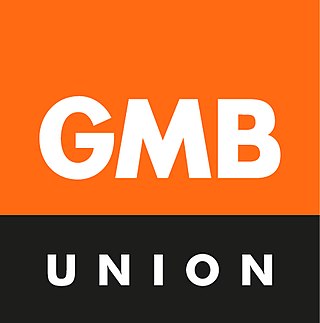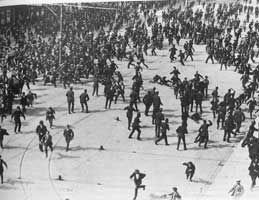Related Research Articles
Skanska AB is a multinational construction and development company based in Sweden. Skanska is the fifth-largest construction company in the world according to Construction Global magazine. Notable Skanska projects include renovation of the United Nations Headquarters, the World Trade Center Transportation Hub project, Moynihan Train Hall, 30 St Mary Axe, MetLife Stadium, Mater Dei Hospital, among others.

The GMB is a general trade union in the United Kingdom which has more than 460,000 members. Its members work in nearly all industrial sectors, in retail, security, schools, distribution, the utilities, social care, the National Health Service (NHS), ambulance service and local government.

The Dublin lock-out was a major industrial dispute between approximately 20,000 workers and 300 employers that took place in Ireland's capital and largest city, Dublin. The dispute, lasting from 26 August 1913 to 18 January 1914, is often viewed as the most severe and significant industrial dispute in Irish history. Central to the dispute was the workers' right to unionise.

Sir Robert McAlpine Limited is a family-owned building and civil engineering company based in Hemel Hempstead, England. It carries out engineering and construction in the infrastructure, heritage, commercial, arena and stadium, healthcare, education and nuclear sectors.
Labour in India refers to employment in the economy of India. In 2020, there were around 476.67 million workers in India, the second largest after China. Out of which, agriculture industry consist of 41.19%, industry sector consist of 26.18% and service sector consist 32.33% of total labour force. Of these over 94 percent work in unincorporated, unorganised enterprises ranging from pushcart vendors to home-based diamond and gem polishing operations. The organised sector includes workers employed by the government, state-owned enterprises and private sector enterprises. In 2008, the organised sector employed 27.5 million workers, of which 17.3 million worked for government or government owned entities. The Human Rights Measurement Initiative finds that India is only doing 43.9% of what should be possible at its level of income for the right to work. Employees are routinely taken advantage of by their employers because of loose labour laws across all industries in India.
The Movement for Justice was set up in 1995 by people around the Kingsway College Student Union in the London Borough of Camden to tackle racism in institutional and established forms. The group confronted organised fascism as well as death in custody and wider racism to black people as well as travellers, refugees and asylum seekers. It is also the sister group to the American organization The Coalition to Defend Affirmative Action, Integration & Immigrant Rights, and Fight for Equality By Any Means Necessary (BAMN).
The Consulting Association (TCA) was a controversial UK business, based in Droitwich, which, from 1993 to 2009, maintained a database of British construction workers and became implicated in a "blacklisting" scandal, which is ongoing. Revelations about the database resulted in the business being shut down, the Employment Relations Act 1999 (Blacklists) Regulations 2010, a Parliamentary enquiry, High Court actions leading to compensation payouts valued at between £50m and £250m in total, and a series of cases being brought to the European Court of Human Rights.

Ebrahim Patel is a South African cabinet minister, who holds the position of Minister of Trade, Industry and Competition. He previously served as Minister of Economic Development from 2009 to 2019.

The News International phone hacking scandal was a controversy involving the now-defunct News of the World and other British newspapers owned by Rupert Murdoch. Employees of the newspaper were accused of engaging in phone hacking, police bribery, and exercising improper influence in the pursuit of stories.
Mark Kennedy, undercover name Mark Stone, is a former London Metropolitan Police officer who, whilst attached to the police service's National Public Order Intelligence Unit, (NPOIU) infiltrated many protest groups between 2003 and 2010 before he was unmasked by political activists as an undercover policeman on 21 October 2010 and his identity was confirmed by the media three days later. During his time under cover he manipulated and deceived several women into having sexual relationships with him with the knowledge of his superiors. An Investigatory Powers Tribunal found his actions to be an “abuse of the highest order" and had “grossly debased, degraded and humiliated” one of his victims.
The News of the World phone hacking scandal investigations followed the revelations in 2005 of voicemail interception on behalf of News of the World. Despite wider evidence of wrongdoing, the News of the World royal phone hacking scandal appeared resolved with the 2007 conviction of the News of the World royal editor Clive Goodman and the private investigator Glenn Mulcaire, and the resignation of editor Andy Coulson. However, a series of civil legal cases and investigations by newspapers, parliament and the police ultimately saw evidence of "industrial scale" phone hacking, leading to the closure of the News of the World on 10 July 2011. However, the affair did not end there, developing into the News Corporation ethics scandal as wrongdoing beyond the News of the World and beyond phone hacking came to light.
The Special Demonstration Squad (SDS) was an undercover unit of Greater London's Metropolitan Police Service, set up in 1968 with the approval of the Wilson government, to infiltrate British protest groups. It was part of the Special Branch, and worked closely with the Crown Prosecution Service (CPS). It operated from 1968 to 2008.
In employment, a blacklist or blacklisting refers to denying people employment for either political reasons, due to a history of trade union activity, or due to a history of whistleblowing, for example on safety or corruption issues. Blacklisting may be done by states as well as by private companies.

Unite the Union, commonly known as Unite, is a British and Irish trade union which was formed on 1 May 2007 by the merger of Amicus and the Transport and General Workers' Union (TGWU). Unite is the second largest trade union in the UK, with over 1.2 million members in construction, manufacturing, transport, logistics and other sectors. The general secretary of Unite is Sharon Graham, who was elected on 25 August 2021 with 46,696 votes on a turnout of 124,127, with her term beginning on 26 August 2021.
A dossier on paedophiles allegedly associated with the British government was assembled by the British Member of Parliament Geoffrey Dickens, who handed it to the then-Home Secretary, Leon Brittan, in 1984. The whereabouts of the dossier is unknown, along with other files on organised child abuse that had been held by the Home Office.
The labour movement or labor movement consists of two main wings: the trade union movement or labor union movement on the one hand, and the political labour movement on the other.
CAPRiM Ltd, was an intelligence service used by corporations.
The South African Railways and Harbours Union was formed by black workers of the South African Railways and Harbours Administration after they had been expelled from the National Union of Railway and Harbour Servants.

The Undercover Policing Inquiry is an independent statutory inquiry into undercover policing in England and Wales. It was announced by Theresa May, the United Kingdom Home Secretary on 6 March 2014, and its terms of reference were published on 16 July 2015. The Inquiry has been chaired by Sir John Mitting since July 2017, following the resignation due to ill-health of Sir Christopher Pitchford.

Housmans is a bookshop in London, England, and is one of the longest-running radical bookshops in the United Kingdom. The shop was founded by a collective of pacifists in 1945 and has been based in Kings Cross, since 1959. Various grassroots organisations have operated from its address, including the Gay Liberation Front, the Campaign for Nuclear Disarmament, and London Greenpeace. Housmans shares its building with its sister organisation Peace News.
References
- The Economic League - The Silent McCarthyism, Mark Hollingsworth and Charles Tremayne (National Council for Civil Liberties), 1989, ISBN 978-0946088355
- Arthur McIvor, "'A Crusade for Capitalism': The Economic League, 1919-1939", Journal of Contemporary History 23 (1988), 631-55
- Christopher W. Miller, "'Extraordinary Gentlemen: the Economic League, business networks, and organised labour in war planning and rearmament", Scottish Labour History 52 (2017), 120-151